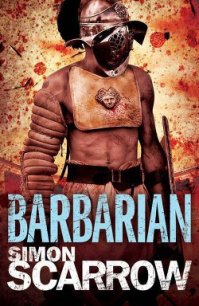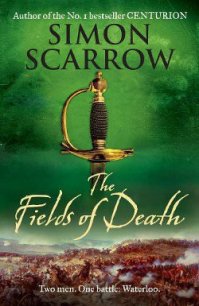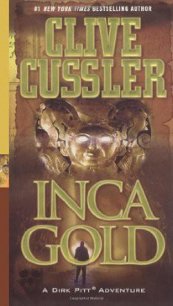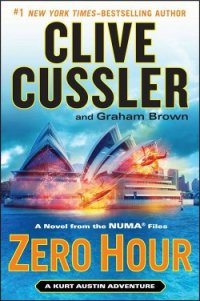Spartan Gold - Cussler Clive (полная версия книги .TXT) 📗
“That seems like an odd story to make up,” Remi said.
“I thought so, too,” Rube replied. “Either way, Bondaruk’s spent millions researching this, so unless he’s certifiably insane he may have found proof to support his claim—at least in his own mind.”
Sam said, “Remi, remember what Kholkov told us in Marseille? About Bondaruk’s goal?”
Remi closed her eyes, recalling the conversation, and Kholkov’s words: “ ‘. . . the items involve a family legacy. He’s simply trying to finish what was begun a long time ago. . . . ’ ”
“This Xerxes angle could be the key,” Sam replied. “But what are the ‘items’? Something Xerxes lost long ago?”
“Another project for Selma and the gang.”
Rube said, “Whether his claim is true is irrelevant. He believes it, and it’s driving everything he does. What he’s after is a different story. Figure that out and you could be halfway home.”
“So we’re back to square one,” Sam said. “What in the world do Xerxes and the Achaemenid Dynasty have to do with Napoleon’s Lost Cellar?”
Sam awoke to the trilling of his iPhone. He rolled over. The red numerals of the LED display said 3:12 A.M. Sam grabbed the phone and checked the caller ID: BLOCKED.
He answered. “Hello?”
“I thought it was time we talked directly,” a voice said. “Without intermediaries.”
Still waking up, it took Sam a moment to place the voice. “You woke me up, Bondaruk. That’s just bad manners. I don’t suppose you’d like to tell me how you got my number?”
“Money is the great equalizer, Mr. Fargo.”
“Money is just money. It’s what you do with it that counts.”
“Spoken like a true do-gooder.”
Remi rolled over and sat up beside Sam. In answer to her questioning expression he mouthed, Bondaruk.
“What do you want?” Sam said.
“I’m curious: You were among the guests at my party, weren’t you?”
“We were standing right behind you during your lecture in the Sword Room. We got the distinct impression you like to hear yourself talk.”
“You’re brave, both of you, I’ll give you that much. You invaded my home, Mr. Fargo. If you were anyone else you’d—”
“Already be dead. Skip the threats and make your point. I’d like to get back to sleep.”
“I’m giving you one last chance. We work together. When it’s over, you get the bottles, I get what I’m after, and we part company. No harm done.”
“Speaking of what you’re after . . . It wouldn’t have anything to do with your private Persian funland below the laboratories, would it?”
Bondaruk didn’t answer.
“I thought so,” Sam said. “Bondaruk, don’t you think you’re taking your Xerxes infatuation a little too far? It’s not healthy.”
“You’re making a mistake, Mr. Fargo.”
“It seems to us that you’ve been making all the mistakes. By the way, we know your people have been casing our house in San Diego. If any of them so much as touch a newspaper in the driveway half the San Diego County Sheriff’s Department will fall on them like an avalanche.”
“So noted. This is the last time I’ll ask nicely.”
“Thanks for the warning.”
Sam hung up.
Remi said, “‘Private Persian funland’? Very imaginative.”
“I have my moments.”
CHAPTER 44
Armed with the next lines of the riddle and Yvette’s broadband Internet connection, Sam and Remi locked themselves in the study and went to work. Yvette, ever the gracious host, ordered Langdon to supply them with snacks and beverages, pens and paper, a second laptop, dry-erase markers, and a four-by-six-foot dry-erase board. On this they wrote the riddle in huge block letters:
Anguished House Fellows in amber trapped;
Tassilo and Pepere Gibbous Baia keep safe the place of Hajj;
The Genius of Ionia, his stride a battle of rivals;
A trio of Quoins, their fourth lost, shall point the way to Frigisinga.
They began by compiling a list of synonyms for each word that easily lent itself multiple meanings. They counted sixteen: “anguished,” “House,” “Fellows,” “trapped,” “Gibbous,” “keep,” “safe,” “place,” “Hajj,” “Genius,” “stride,” “battle,” “rivals,” “trio,” “point,” “way.”
From these they generated a list of dozens of words. Those they wrote on the board’s opposite side in a spiderweb-like chart, branch leading to thread leading to question marks.
Next they turned their attention to words they felt had clear links to history—“amber,” “Tassilo,” “Baia,” “Hajj,” “Genius,” “Ionia,” “Quoins”—which they also placed on the board, in their own separate columns and lists. Once done they divided up the words and began scouring the Internet for historical references, which they plugged into briefs of each word.
Five of the words—“amber,” “Tassilo,” “Baia,” “Hajj,” “Ionia”—had links to well-known places, peoples, or things. Amber was a fossil resin used for jewelry; Tassilo was the given name of a long line of Bavarian kings; Hajj was the name of the yearly Islamic pilgrimage to the holy site of Mecca; Baia, which meant “mine,” was the name of a commune in Romania on the Moldova River; and Ionia was a Greek island in the North Aegean Sea.
Unfortunately, like their list of synonyms, each of these historical references was in itself a web of facts and double meanings and cross connections.
Breaking only to eat and drink and refresh themselves in the study’s attached bathroom, Sam and Remi kept at it through the morning into late afternoon until finally they decided on a different tack: to focus their attention on a single line of the riddle, hoping its solution would start a domino effect. They decided to try the second line.
“ ‘Tassilo and Pepere Gibbous Baia keep safe the place of Hajj,’ ” Remi recited, absently tapping her temple with a pencil. “Pepere is easy. It’s a French nickname for ‘grandfather.’”
“Right. And unless we’re missing some other significant reference to Tassilo, we can assume it’s a reference to Bavaria—its history, its landmarks, its culture. Something Bavarian.”
“Agreed. How about ‘Gibbous Baia’?”
They’d already devoted two fruitless hours to Romanian history in hopes of stumbling across an epiphany about the Baia area.
“ ‘Gibbous’ means a moon that’s between half and completely full.”
“Are we sure about that part?”
“Yes, a gibbous moon is—”
“No, I’m asking if that’s the only meaning.”
Sam thought for a moment, then frowned. “I’d assumed so. Maybe I shouldn’t have.” He picked up and shoved books around the desk until he found the dictionary. He found the correct page, scanned the entry, then clicked his tongue. “Dumb, Sam. . . .”
“What?”
“ ‘Gibbous’ also means ‘humpbacked.’ So Gibbous and Baia . . .”
Remi was already typing on the laptop. Though much of their in-depth references had come from library sites, their default starting point was good old Google. “Here . . . got something,” she said after a few minutes of reading. “Put the two together and you get this: Baia is part of a phrase—‘men of Baia.’ It’s a rough translation for the word ‘Bavaria.’ ”
“So, the Humpback of Bavaria?” Sam asked.
“No, no . . .” Remi tapped the keyboard again and scanned the search results. “Gotcha! Okay, Tassilo III, the king of Bavaria from 748 to 787, was installed on the throne by Pepin the Short, father of Charlemagne and grandfather of Pepin the Hunchback.”
“Now we’re talking,” Sam replied. “So Tassilo and the hunchback’s grandfather, Pepin the Short, ‘keep safe the place of Hajj.’ ”
“Problem is I can’t find any connection between either of them, or Bavaria, to Mecca.”
“It has to be a metaphor or a synonym,” Sam replied.




